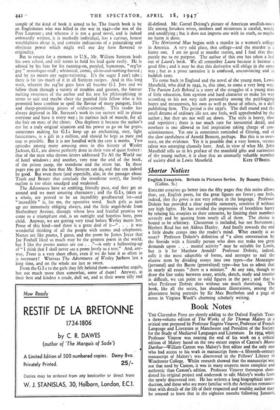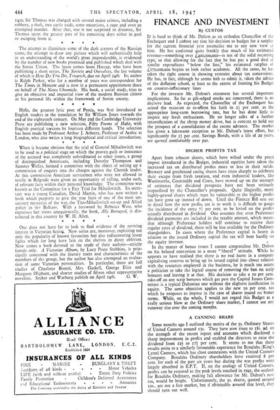Book Notes
THE Clarendon Press are shortly adding to the Oxford English Texts a three-volume edition of The Works of Sir Thomas Malory in a critical text prepared by Professor Eugene Vinaver, Professor of French Language and Literature at Manchester and President of the Society for the Study of Mediaeval Languages and Literature. In 1934, while Professor Vinaver was nearing the end of his work on a critical edition of Malory based on the two extant copies of Caxton's Morte Darthur—William Caxton was Malory's first editor and the only one who had access to his work in manuscript form—a fifteenth-century manuscript of Malory's was discovered in the Fellows' Library in Winchester College. Whilst research showed that the manuscript was not that used by Caxton, it was in many respects more complete and authentic than Caxton's edition. Professor Vinaver thereupon aban- doned his original project and undertook to edit Malory's works from the newly discovered text. He has written a long biographical intro- duction, and those who are more familiar with.the Arthurian romances than with details of the life of their respected and wealthy author may be amused to learn that in the eighteen months following January,
1450, Sir Thomas was charged with several major crimes, including a robbery, a theft, two cattle raids, some extortions, a rape and even an attempted murder. After that, one-is not surprised to discover, Sir Thomas spent the greater part of his remaining days either in gaol or escaping from it. • * * The attempt to illuminate some of the dark corners of the Russian scene, the attempt to draw any picture which will authentically help in an understanding of the world's great imponderable, is evidenced by the number of new books promised and published which deal with the Soviet Union. The latest comes from Harrap, who have been publishing a short series, The Soviets and Ourselves, the last volume of which is How Do You Do, Tovarich, due on April 24th. Its author is Ralph Parker, who for a number of years was correspondent for The Times in Moscow and is now in a permanent appointment there on behalf of The News Chronicle. His book, a social study, tries to give an objective and impartial view of the modern Russian citizen in his personal life within the framework of Soviet society.
* * * * Hafiz, the greatest lyric poet of Persia, was first introduced to English readers in the translation by Sir William Jones towards the end of the eighteenth century. On May 2nd the Cambridge University Press are publishing a new selection, Fifty Poems of Hafiz, with English poetical versions by fourteen different hands. The selection has been made by Professor Arthur J. Arberry, Professor of Arabic at London, who also writes a long biographical and critical introduction. * * * * When it became obvious that the trial of General Mihailovitch was to be used as a political stage on which the proven guilt or innocence of the accused was completely subordinated to other issues, a group of distinguished Americans, including Dorothy Thompson and Sumner Welles, formed a committee with the object of setting up a commission of enquiry into the charges against the Chetnik leader. At this commission American servicemen who were not allowed to testify in Belgrade were given an opportunity of telling, under oath, of relevant facts within their personal knowledge. The committee was known as the Committee for a Fair Trial for Mihailovitch. Its secre- tary was a young Canadian, David Martin, who has now written a book which purports to give the true facts of one of the most un- savoury mysteries of the war, the Tito-Mihailovitch set-up and Allied policy in the Balkans. With a foreword by Rebecca West, who expresses her views unequivocally, the book, Ally Betrayed, is dis- tributed in this country by W. H. Allen. • One does not have far to look to find evidence of the reviving interest in Victorian fiction. New series are, moreover, exploiting not only the popularity of known favourites but also rediscovering lesser lights which for long have lain on the shelves in dusty oblivion. Now comes a book devoted to the study of their authors—strictly female only. A Victorian Album, by Lucy Poate Stebbins, is prin- cipally concerned with the literary traits and characteristics of the members of the group, but the author has also attempted an evalua- tion of some Victorian personalities. In particular, there are full studies of Charlotte Brontë, Mrs. Gaskell, George Eliot and Margaret Oliphant, and shorter studies of fifteen other representative novelists. Secker and Warburg publish on April 24th. G. W.



































 Previous page
Previous page